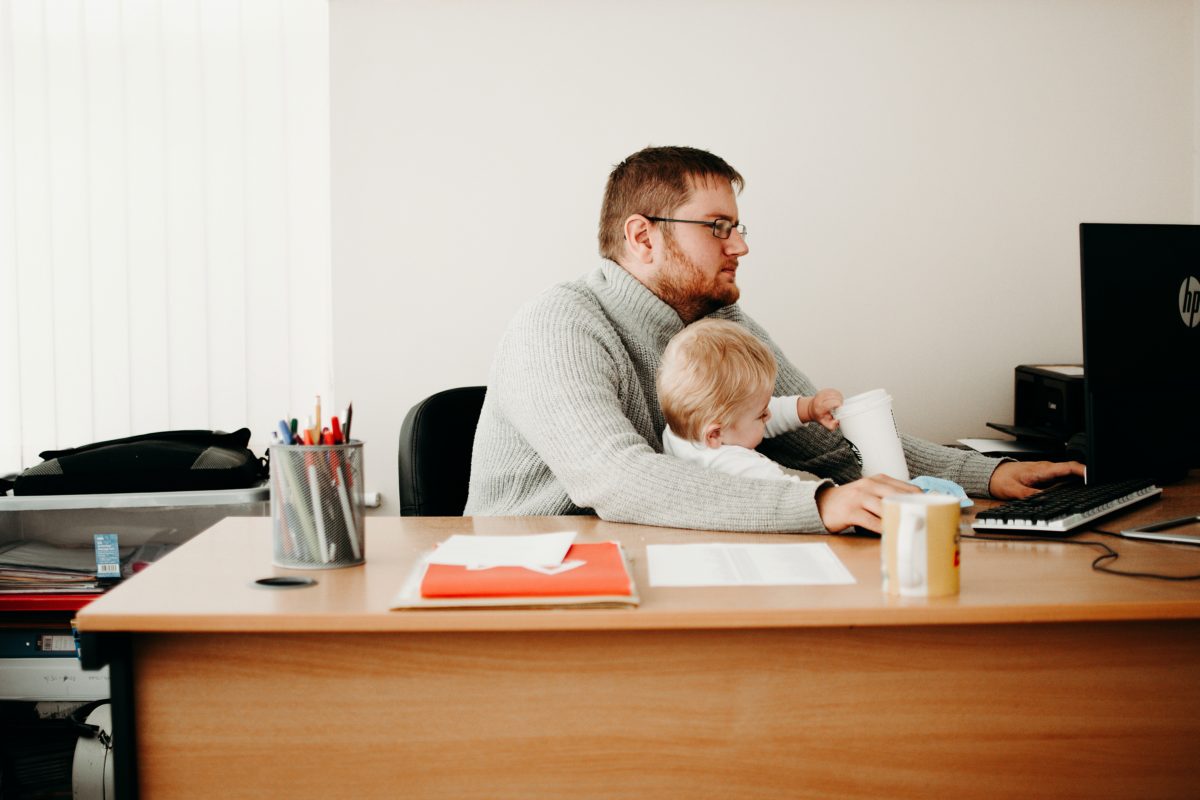Learn about best-practice policies around parental leave and family wellbeing, and what big names such as QBE, HESTA and ING are doing to support working parents.
Last week was the United Nations’ Global Parent’s Day (June 1). To mark the occasion, UNICEF Australia and Parents At Work released a new research report highlighting Australian workplace policy progress around supporting working families.
Progress has been slowly improving over the last few years as companies look to make flexible work practices mainstream, but the lingering impact of COVID-19 continues to challenge how employees will combine work and caring commitments in the future – especially women.
Work and home life has become blended without clear boundaries, and the rise of hybrid work means it’s more relevant for businesses to look closely at how they make their workplaces more inclusive and accessible, particularly for employees with caring responsibilities.
Encouragingly, it seems many businesses are paying attention to this challenge. We have seen a willingness to improve family workplace policies to ensure they are adequately supporting employees to meet their professional and personal obligations.
Parents At Work and UNICEF Australia work with many organisations that exemplify best-practice when it comes to developing family friendly policies and practices. Many of these companies are setting the standards within the areas of parental leave, flexible work, and family care and wellbeing.
Below are some of the initiatives these organisations have implemented.
Top parental leave options
For employers looking to attract and retain great people amid such a tight talent market, a compelling paid parental leave policy is a must.
It’s no longer adequate to offer haphazard support to expectant parents and carers, leaving them to cobble together fragmented leave options.
Parental leave needs to be accessed by new parents regardless of their gender, removing primary and secondary care labels and offering progressive leave provisions for employees who may experience pregnancy loss or perinatal and postnatal anxiety and depression.
Best-practice minimum parental leave requirements for employers includes:
-
- Ensuring an inclusive paid parental leave policy or framework exists with provisions to consider pregnancy loss, perinatal and postnatal anxiety and depression.
- Processes exist to support employees prior to, during and returning from parental or caring leave.
- Leaders are educated and enabled to manage parental/carers leave requests and facilitate return to work.
- Ensuring an inclusive paid parental leave policy or framework exists with provisions to consider pregnancy loss, perinatal and postnatal anxiety and depression.
Leading the charge when it comes to inclusive paid parental leave are QBE Insurance, KPMG, Deloitte, ING Australia, Novartis and Medibank, which all offer flexible, gender neutral, label-free policies and return-to-work support for their people.

Deloitte Australia has been consistently progressive when it comes to its parental leave commitments. It removed primary and secondary carer labels some years ago, and offers 18 weeks’ paid leave, including superannuation, that can be taken flexibly over 36 months, with partners being able to take the leave at the same time.
In addition, it offers comprehensive transition support for those commencing leave and returning to work, which includes individual coaching sessions. Of those recently surveyed 92 per cent of Deloitte parents reported an increase in work life satisfaction as a result of the coaching.
In March this year, Deloitte announced further enhancements to its parental leave policy with the offer of an additional support payment for a period of 12 months for all parents returning to work from parental leave, along with revised performance targets to help ensure a great return to work.
Read HRM’s article about Deloitte’s ReConnect Program here.
Likewise QBE Insurance offers a comprehensive paid leave option with its ‘Share The Care’ policy that mainstreams flexible paid parental leave for both women and men. Since doing so, QBE has reported a 300 per cent uplift in men stepping forward to take the leave.
“When family friendly organisations like ours actively speak about, promote and encourage caring in all its forms, people are far more likely to feel supported and confident to share their unique needs and seek the support they may need now and in the future,” says Sue Houghton, CEO, QBE Insurance.
“Gender equal policies, and mainstreaming caring responsibilities for both men and women, are ways we have shown we can have a great impact in driving positive change at an individual and organisational level.”
Caring Support
A huge part of support for families, and an area that has been lacking in workplaces up until recently, is the inclusion of policies and programs that specifically address the needs of carers.
With over 2.65 million carers in Australia (1 in 11 people), it’s vital that all carers are supported in balancing their work and caring responsibilities.
Of the 70 organisations we partner with, 55 per cent have committed to embedding a formalised carer’s policy or extending their current policy provisions as part of their ongoing commitment to supporting working families.
Best-practice minimum requirements for employers include:
-
- Having a carers policy or framework in place.
- Ensuring caring provisions are supported and promoted.
- Ensuring employees are supported in emergency caring situations.
- Having breastfeeding support in place and communicating this support broadly.
- Leaders are enabled to support employees with caring responsibilities.
KPMG, PEXA, Workday and Endeavour Energy are standouts when it comes to support for carers.
PEXA, an electronic Conveyancing firm, acknowledges both backup and emergency care along with a benefits program for monthly subsidies to parents for childcare. It pays parents up to $1000 per month to support the costs of childcare, as well as offering school holiday programs in which its training room in Melbourne is repurposed and decorated during holiday periods for kids’ activities that are run by teachers.
KPMG stepped up its investment in family care too, running KidsCo virtual holiday programs to support working parents and carers during school holiday periods.
“As one of Australia’s largest employers, we have an important role to play fostering a culture of care, equality and respect so that our people can be at their best at work and at home.” – Alan Docherty, Chief Financial Officer, CBA
Finance and HR provider Workday and energy provider Endeavour Energy are standouts when it comes to carer support. Workday provides its carers with 50 per cent of pay for 12 weeks in the case of an emergency, along with family wide health insurance to all employees.
It also offers onsite childcare for working parents and carers, as well as mental wellbeing support where required.
Workday and Endeavour are great examples of what organisations can be offering carers to enable them to thrive at work and at home.
Leading flexible work strategies
Employees are looking to employers to extend flexible and hybrid ways of working to better support their home and lifestyle needs.
Our 2019 National Working Families report revealed the need for greater flexibility and support for workers with caring responsibilities, with over half of the 6300 participants saying they felt their “commitment to their job was questioned if they used family friendly work arrangements.”
The minimum best-practice requirements for employers includes ensuring:
-
- A flexible work policy or framework exists and is accessible to all employees.
- Flexible work is promoted and supported across all levels of the organisation.
- Technology and tools are provided to enable flexible work to be embedded.
- Leaders are enabled to manage a flexible workplace and workforce.
Leading outplacement agency Randstad RiseSmart recently launched a ‘flex from anywhere’ policy, where individuals can work remotely anywhere around the world for up to eight weeks a year.
ING Australia is also leading the charge with a progressive flexible work policy called ‘FlexING’ which includes provisions for varying start and finishing times to help people manage school pick ups and peak hour traffic, or to allow them time to study.
“We think our approach [to family friendly workplace culture] is the right one for any modern workplace wanting to encourage happier, healthier and higher performing people – both at work and in their personal lives,” says ING Australia CEO Melanie Evans.
Family wellbeing support
The need for organisations to not only recognise the prevalence of family and domestic violence occurring in Australian homes, but to respond to it by providing adequate leave and support services has become paramount.
Some of our partner organisations have given particular focus to this area in support of family mental health and wellbeing, with 34 per cent of them working towards updating their wellbeing policy or practices to be more inclusive of family mental health needs.
Best-practice minimum requirements for employers include:
-
- Offering wellbeing support to employees and their families.
- Promoting and supporting physical and mental health along with financial wellbeing.
- Having a policy and responsive education and support plan in place around Family and Domestic Abuse and Violence.
- Educating and enabling leaders to promote and embed policies and practices that support family wellbeing.
Read HRM’s article on a three-step guide to respond to domestic violence at work.
The Commonwealth Bank of Australia (CBA) is leading in this space. CBA has strong policies in place in relation to stillbirth, infant loss, parenting-related anxiety and depression, and domestic and family violence. Its stance on domestic and family violence goes an extra step in also supporting the carers of those impacted.
“As one of Australia’s largest employers, we have an important role to play fostering a culture of care, equality and respect so that our people can be at their best at work and at home,” says Alan Docherty, CBA’s Chief Financial Officer.

Industry super fund HESTA invests in both internal and external programs to support families and gender equality, and has recently launched a Work + Family Hub for all its families, providing extensive wellbeing support for parents and carers across all stages of parenting and caring.
Acknowledging that all families will deal with unique challenges and circumstances, tech giant Microsoft has added specific neurodiversity support to its practices, including counselling support for parents with neurodiverse children.
Demonstrating care
People want to work for organisations that care about them and their family responsibilities outside of work. Your organisation’s culture has an impact on employees’ health and wellbeing and, therefore, the wellbeing of your business.
Our report helps organisations to understand the benefits of championing a family friendly workplace agenda. It highlights key data insights and emerging trends from our 70 partner organisations and combines this with global evidence-based research and encourages employers to do what they can to drive greater support to their people.
Employers are now encouraging their people to ‘bring their whole selves to work’ – and that often means their family responsibilities. If leaders want to champion this authenticity, they also need to provide the foundations for it to take place. And that’s exactly what these organisations are doing.
Emma Walsh is the CEO of Parents At Work, a social impact global advisory group providing work and family care solutions to businesses to create family-friendly workplaces.
Learn how to create policies to support working parents – as well as a range of other work areas – with this short course from AHRI. Sign up for the next session on 17 June 2022.

